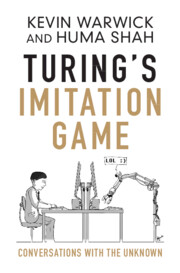Book contents
- Frontmatter
- Contents
- Introduction
- 1 Turing the Man
- PART ONE
- PART TWO
- Introduction to Part Two
- 7 The 2008 Reading University Turing Tests
- 8 2012 Tests – Bletchley Park
- 9 Interviews with Elite Machine Developers
- 10 Turing2014: Tests at The Royal Society, June 2014
- 11 The Reaction to Turing2014
- Index
- References
9 - Interviews with Elite Machine Developers
from PART TWO
Published online by Cambridge University Press: 12 October 2016
- Frontmatter
- Contents
- Introduction
- 1 Turing the Man
- PART ONE
- PART TWO
- Introduction to Part Two
- 7 The 2008 Reading University Turing Tests
- 8 2012 Tests – Bletchley Park
- 9 Interviews with Elite Machine Developers
- 10 Turing2014: Tests at The Royal Society, June 2014
- 11 The Reaction to Turing2014
- Index
- References
Summary
In 2014 five of the machine developers who took part in the 2012 Bletchley Park Turing test experiment were again invited to take part in a further experiment at The Royal Society in London (see Chapter 10). These were:
• Rollo Carpenter, developer of Cleverbot
• Fred Roberts, developer of Elbot
• Robby Garner, developer of JFRED/TuringHub
• Robert Medeksza, developer of Ultra Hal
• Vladimir Veselov, lead developer of Eugene Goostman.
All of these except Robby Garner, had also taken part in the 2008 Reading University Turing test experiment (see Chapter 7). In addition all the developers were asked about their views on conversation systems and their opinion as to whether the Turing test was relevant to them. Veselov, leading the team behind Eugene Goostman was not able to provide details: the system and its technology is owned by iFree, a Russian company.
This chapter recounts those views, which we think give the reader a flavour of each machine's conversation style. We begin by presenting questions put to four of the developers, with their answers, which we think together provide some insight into approaches to building dialogue agents. We then provide brief commentary on the five-minute exchanges between Shah and the 2014 online version of the five systems. Where the website recorded it the exchanges are presented.
Developer questions
During the preparations for the 2014 Turing tests at the Royal Society each of the five invited developers were asked, amonst other things:
(1) To explain their background and their views on the Turing test.
(2) If and how they negotiate ‘Winograd schema’, i.e. disambiguating ambiguous input from users who interact with the systems (Winograd, S.1970; Levesque, H.2011).
(3) How the system deals with linguistic cultural differences from those of the system in question. For example, how to deal with different versions of English.
(4) Describe the abuse their systems have received via the web.
Developer responses
Ultra Hal – Robert Medeksza
I am president of Zabaware, Inc. and creator of the Ultra Hal chatbot. Ultra Hal is a learning bot that learns from past conversations. Every conversation it has had is recorded in a large database (currently over 21 million sentences) and it does a statistical analysis to find similar conversational threads in order to come up with responses.
- Type
- Chapter
- Information
- Turing's Imitation GameConversations with the Unknown, pp. 159 - 170Publisher: Cambridge University PressPrint publication year: 2016

